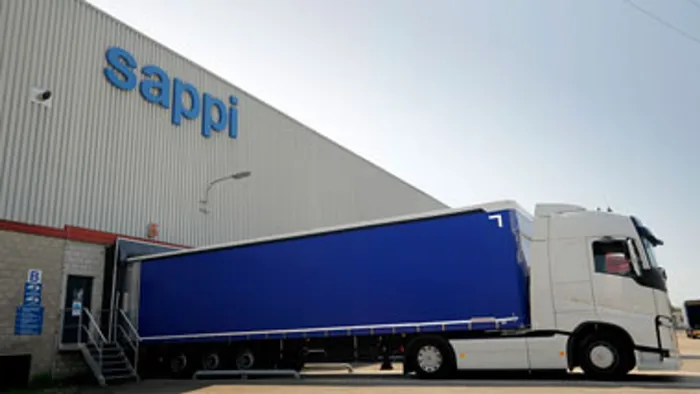
Sappi Southern Africa operations South African operations delivered R26.18 billion in revenue with adjusted EBITDA of R5.2bn for the year to September 30, 2025, a stable performance in the face of challenging global paper market conditions.
Image: Supplied
Sappi’s share price surged over 9% on the JSE on Thursday after it forecasted an improvement in its 2026 financial year, following a loss for 2025.
The woodfibre product manufacturer for global markets will focus on debt and strengthening its balance sheet through targeted cost savings, and operational efficiency improvements, CEO Steve Binnie said.
The share price traded 9.47% higher at R25.20 on Thursday morning - the price has ticked downward steadily this year from R54.10.
The group, which manufactures on three continents and sells products in over 150 countries, reported headline earnings per share sliding to a US 19 cents loss for the year to September 30, 2025, compared with the one US cent profit the year before.
“We’re all in the same boat. Our peers in South Africa, Europe, and the US are all going through challenging times. We are going through a period where we are all inwardly focused on strengthening our balance sheets,” Binnie said in an online presentation. A key US investment would be bedded down, and debt would be reduced, he said.
Adjusted earnings before interest, taxation, depreciation, amortisation, and special items (EBITDA) fell to $501 million. The loss for the period came at $177m versus an $33 million profit at the end of the 2024 financial year.
Binnie said capital expenditure would be reduced to below $300 million per year for two years, barring that required for maintenance. He said they were “optimistic” that things would improve in the 2026 financial year and that “things would get better” through each quarter of the year.
He said the group had ended the year with a strong balance sheet, with cash on hand of $219m and $602m from unutilised revolving credit facilities (RCF) in South Africa and Europe. He said the group was benefiting from strong institutional investor support from long-term anchor shareholders and a positive analyst consensus outlook.
The South African region delivered a satisfactory performance in challenging global paper market conditions, weaker dissolving wood pulp (DWP) pricing, and adverse exchange rate movements affecting the pulp segment.
Domestic containerboard demand was boosted after citrus production was significantly higher. South African operations delivered R26.18 billion in revenue with adjusted EBITDA of R5.2bn.
Revenue for the North American operations was $1.73bn with adjusted EBITDA of $133mr. A highlight was completing the Somerset Mill PM2 conversion and expansion project. Although start-up was delayed, the technical ramp-up saw good initial market feedback on product quality.
Sales volumes for packaging and specialty papers increased 22% compared to the previous year as production at the Somerset Mill stabilised and the PM2 ramp-up progressed. Despite the higher sales, segment profitability remained below last year, primarily due to lower pricing in weak markets and higher costs. Costs increased in line with expectations and reflected operational inefficiencies and limited fixed cost absorption during the transitional PM2 ramp-up phase.
Market conditions in Europe remained challenging with high levels of competition, an oversupplied market, and weak demand. Packaging and specialty papers segment sales volumes improved 8%, driven primarily by higher label paper sales, while paperboard demand was stable, and flexible packaging—especially in the dairy segment—showed signs of recovery. The region delivered revenue of €2.03bn and adjusted EBITDA of €58m.
On the outlook for the first financial quarter of 2026, Binnie said: “Taking into account the market factors and the scheduled maintenance shut at the Somerset Mill, we anticipate that adjusted EBITDA for the first quarter of FY2026 will be below that of the fourth quarter of FY2025.”
He said however they remain a well-capitalised business with a proven ability to adapt and respond to market cycles.
“Our recent strategic growth investments in packaging and speciality papers and dissolving wood pulp (DWP) have strengthened our portfolio and position us well to benefit from a market recovery,” he said.
Visit:www.businessreport.co.za